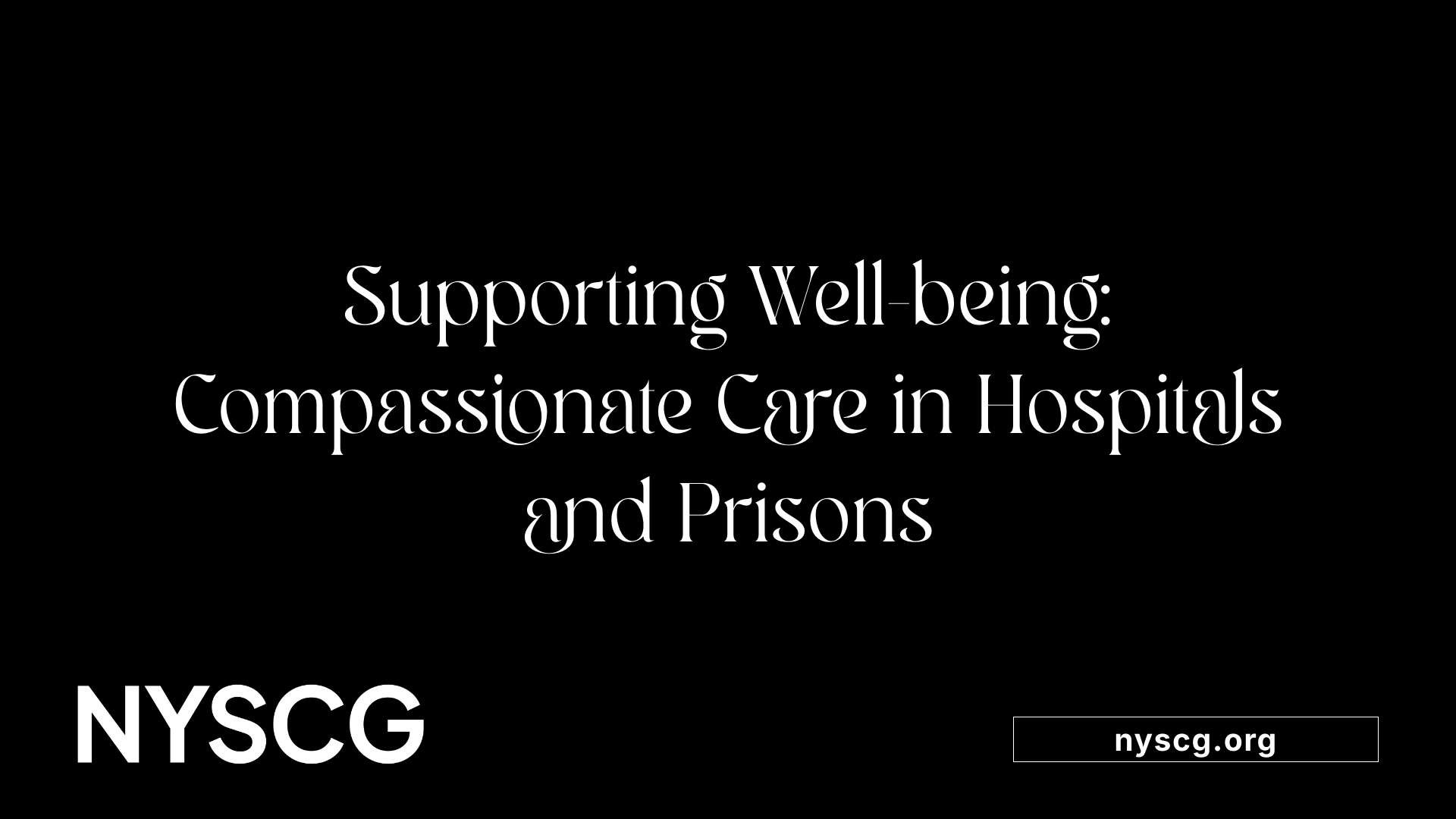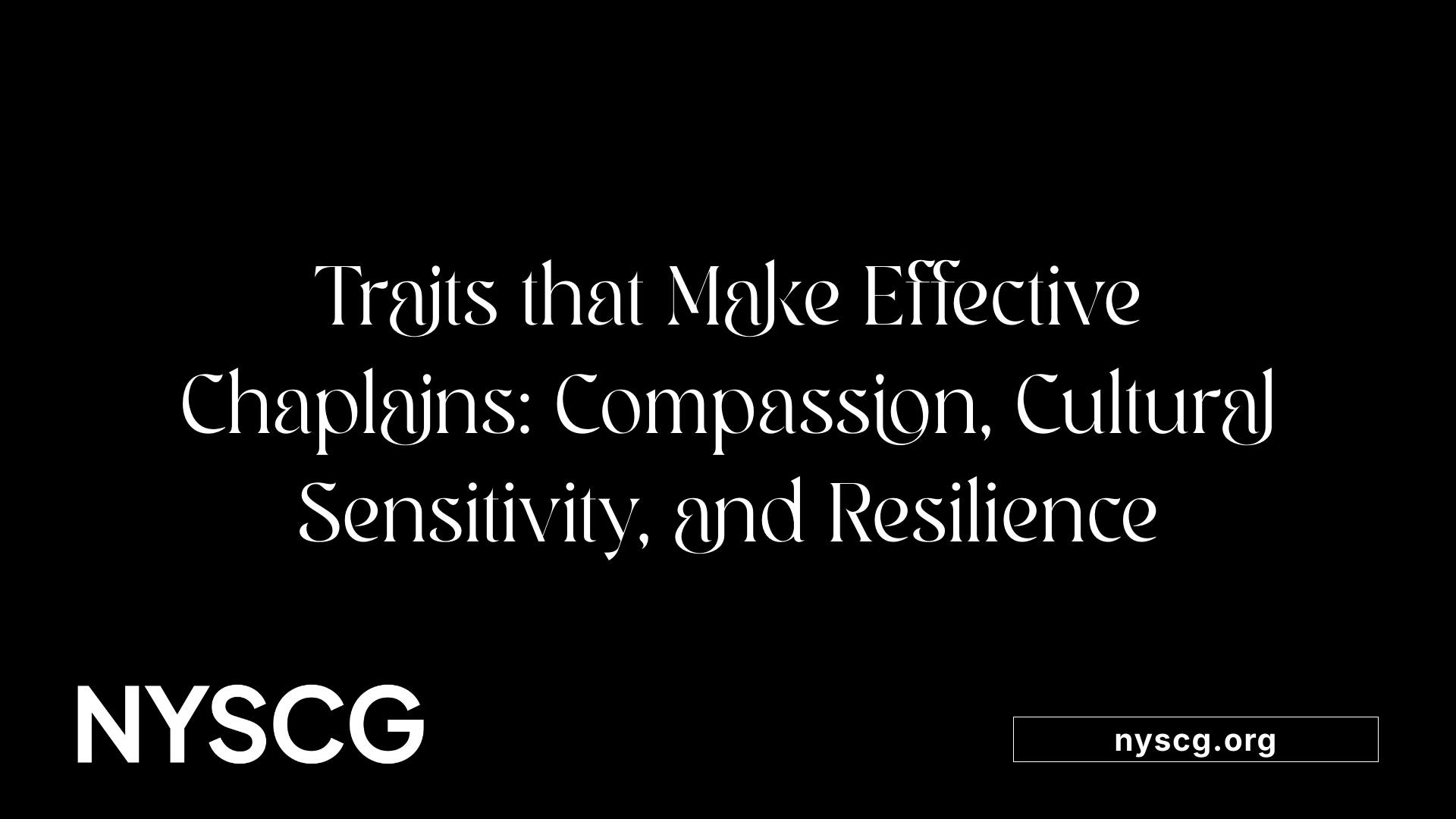How Is Chaplain Work Different in Prisons vs. Hospitals?


Chaplains serve as vital spiritual caregivers across a variety of institutional settings, notably in prisons and hospitals. While their core mission involves providing compassionate support and fostering hope, the specific nature of their roles varies greatly depending on the environment. This article delves into how chaplaincy in correctional and healthcare contexts differs in terms of responsibilities, challenges, and practices, highlighting the traits of effective chaplains and the institutional factors shaping their work.
Chaplains serve in a variety of settings, each with unique responsibilities tailored to the needs of those they serve. Understanding the different types helps to appreciate the broad scope and importance of their work.
Hospital chaplains provide essential spiritual and emotional support to patients, families, and healthcare staff. They offer counseling, facilitate religious rites, and help individuals navigate illness, grief, and health crises. Their presence aims to bring comfort during stressful times, helping patients find meaning and hope amid medical challenges. Hospital chaplains are trained to support patients regardless of their religious background or beliefs, emphasizing compassionate listening and personalized care.
In the military, chaplains serve service members, veterans, and their families. They provide spiritual guidance, lead religious services, and act as moral advisors in high-stress environments. Military chaplains often hold the rank of captain and are endorsed by their religious denominations. Their role extends beyond worship services, offering counsel on ethical dilemmas, facilitating rites of passage like marriages and funerals, and supporting personnel during deployment, injury, or loss.
Prison chaplains play a crucial part within correctional facilities. They oversee religious programs, offer spiritual counseling, and support inmates’ rehabilitation and reintegration into society. Their work involves fostering moral growth, encouraging positive spiritual development, and aiding inmates in developing a hopeful outlook for life after incarceration. They also support correctional staff and may work with families of inmates, helping to promote order and emotional well-being within the facility.
School chaplains provide spiritual and ethical support to students and staff across diverse faith backgrounds. They often serve as counselors, addressing issues like moral dilemmas, mental health challenges, and social conflicts. While less common in some regions, school chaplains focus on fostering a caring environment that respects individual beliefs and supports the holistic development of young people.
| Type of Chaplain | Primary Focus | Typical Activities | Settings and Demographics |
|---|---|---|---|
| Hospital | Patient & Staff Support | Counseling, religious rites, crisis care | Hospitals, clinics, healthcare facilities |
| Military | Service Members & Veterans | Religious services, moral advice, rites of passage | Military bases, VA hospitals, service academies |
| Prison | Inmate Rehabilitation & Support | Religious programs, counseling, emotional healing | Prisons, jails, detention centers |
| School | Student & Staff Well-being | Counseling, ethical guidance, crisis intervention | Schools, colleges, youth organizations |
Each type of chaplain works in environments that demand cultural sensitivity, emotional resilience, and a deep commitment to service. They often collaborate with other professionals—medical teams, military leaders, correctional officers, and educators—to provide comprehensive care rooted in compassion and respect.
Chaplaincy continues to evolve, embracing a more inclusive and interdisciplinary approach. Modern chaplains are equipped to serve diverse populations, including those who may not identify with traditional religious affiliations but seek support for their spiritual or existential questions.
Their work exemplifies a universal commitment to human dignity, emotional support, and the quest for meaning, regardless of the setting or background of those they serve.

Chaplains play essential roles in a variety of institutional environments, providing tailored spiritual, emotional, and pastoral support to the populations they serve. Their responsibilities adapt to the specific needs and challenges of each setting, ensuring holistic care and support.
In healthcare settings, such as hospitals, nursing homes, and hospices, chaplains focus on addressing the emotional and spiritual needs of patients, their families, and staff members. They engage in crisis intervention during emergencies and provide grief counseling to those coping with loss or terminal illness. They also perform religious rituals—such as prayers, blessings, and sacraments—as requested by patients or their families. Collaboration with healthcare teams is crucial, as chaplains help integrate spiritual care into overall treatment plans, supporting patients’ mental well-being alongside medical care.
In correctional environments, chaplains serve a different but equally vital role. They organize religious services, deliver moral guidance, and provide emotional support within prisons and jails. Many operate within a clinical or therapeutic model that emphasizes rehabilitation, relapse prevention, and reducing recidivism. Here, chaplains often lead faith-based programs aimed at promoting moral development and personal growth. They also facilitate faith formation activities and work closely with correctional staff to maintain order and support positive behavioral change.
In addition to spiritual services, prison chaplains foster hope and resilience among inmates while respecting diverse beliefs and backgrounds. Their work may involve counseling individuals on personal issues, substance abuse, or mental health challenges, helping offenders develop a positive outlook and move toward successful reintegration into society.
Military chaplains serve service members and their families, providing a confidential space for spiritual support during deployment, injury, or loss. They conduct religious ceremonies, offer moral guidance, and support unit cohesion by advising commanders on moral and spiritual concerns. Their role also includes supporting families of deployed personnel and those who have suffered injuries or deaths, ensuring emotional well-being during difficult times.
In all settings, chaplains are responsible for officiating religious ceremonies, offering spiritual counseling, advocating for individuals’ spiritual needs, and working collaboratively with other professionals—such as healthcare providers, mental health specialists, and correctional staff—to promote overall well-being. They often act as advocates for religious and spiritual expression, respecting individual beliefs while fostering environments of inclusivity and support.
The scope of their responsibilities also encompasses policy implementation, volunteer coordination, and program management. For example, in correctional facilities, chaplains oversee religious programming and manage volunteer efforts, while in hospitals, they may lead spiritual education sessions or support groups.
Ultimately, whether supporting a patient in a hospital, guiding an inmate through rehabilitation, or providing moral guidance to service members, chaplains serve as compassionate, adaptable caretakers committed to the spiritual and emotional healing of those they serve.

Hospital chaplains play a vital role in providing spiritual care that goes beyond just religious rituals. Their work begins with active listening, offering comfort, and understanding the unique needs of each patient, regardless of faith or belief system.
They conduct one-on-one visits, including crisis intervention for those facing medical emergencies or dealing with grief and loss. In addition, hospital chaplains assist patients with understanding and coping with complex medical procedures, often providing explanations that help reduce anxiety and foster hope.
Support from hospital chaplains is specialized to meet the needs of diverse populations. They handle emotional and spiritual issues that may arise during illness, helping patients find meaning in their experiences and encouraging resilience.
Chaplains often work as part of a multidisciplinary health care team, collaborating with doctors, nurses, social workers, and counselors. They help develop personalized care plans that include spiritual support, ensuring holistic healing.
Their services are highly adaptable, especially during crises such as the COVID-19 pandemic, where many have used remote methods like phone and video calls to maintain contact.
Additionally, hospital chaplains support healthcare staff by addressing burnout and emotional fatigue, fostering an environment of compassion and care.
The core of their work is rooted in respect for individual beliefs, whether religious, spiritual, or secular, and creating a safe space for patients to express doubts, fears, or hopes.
Prison chaplains serve as moral guides and sources of hope for incarcerated individuals. They lead religious services and facilitate faith formation classes, helping inmates deepen their spiritual understanding.
Beyond religious activities, chaplains provide pastoral counseling, addressing issues of morality, self-control, and personal development. They focus on emotional resilience, offering support during moments of crisis and helping inmates navigate the prison environment.
Many programs aim at rehabilitation, aiming to reduce recidivism through fostering positive change, emotional healing, and spiritual growth. Chaplains are also involved in programs that focus on life skills and substance abuse recovery.
Counseling services include discussions on morality and hope, often tailored to individuals' faith backgrounds or personal beliefs. Most chaplains believe that spiritual support after release is crucial for successful reintegration into society.
Hospital chaplains are trained to support people from all walks of life. They respect and accommodate a wide array of religious beliefs, cultural backgrounds, and spiritual orientations.
Their goal is to support emotional well-being, help individuals find personal meaning during illness, and provide comfort, whether or not the person identifies with a religion.
For those without religious beliefs, chaplains offer reflection spaces, mindfulness, and support that align with personal values or secular philosophies.
This inclusivity ensures that spiritual care is accessible to everyone, and the focus remains on human connection and emotional support.
In the correctional environment, chaplains are essential in promoting moral reform and emotional stability. They provide a non-judgmental space where inmates can explore personal beliefs, confront moral issues, and develop hope.
Chaplains help inmates find purpose and support their emotional health, which is vital in a setting where despair and hopelessness are common.
Programs led by chaplains often include faith-based group activities, mentorship, and life coaching that aim to aid rehabilitation.
Through these efforts, chaplains contribute to creating a more orderly, disciplined environment and help inmates prepare for rehabilitation and reintegration.
| Setting | Support Focus | Activities | Goals | Typical Participants |
|---|---|---|---|---|
| Hospital | Emotional & Spiritual | Patient visits, crisis intervention, grief counseling | Holistic healing, emotional resilience | Patients, families, hospital staff |
| Prison | Faith & Moral Development | Religious services, counseling, faith formation | Hope, moral growth, reduced recidivism | Incarcerated individuals |
| Both | Diversity & Inclusivity | Respect for beliefs, support of secular needs | Human dignity, personal meaning | All individuals in care |
Chaplains are trained professionals endorsed by their denominations or certifications, equipped with skills to serve diverse populations. The work environment, especially in prisons, can be demanding and stressful, but their presence remains vital in providing compassionate spiritual support.
Whether in healthcare or correctional settings, chaplains uphold principles of empathy, inclusivity, and respect, guiding individuals through some of the most challenging moments of life.
Their roles expand continually, reflecting an evolving understanding of spirituality and human support that includes diverse faiths, secular philosophies, and holistic care models.

Effective chaplains share several core qualities that enable them to serve diverse populations in various institutional settings. They are primarily compassionate and empathetic, with exceptional listening skills that allow them to understand and validate the feelings of those they support.
Cultural sensitivity and humility are vital traits, helping chaplains to respect and adapt to the beliefs and backgrounds of the individuals they serve. This approach fosters trust and openness, which are critical for meaningful spiritual support.
Chaplains must strike a balance between confidence in their own faith or spiritual perspective and humility towards others’ beliefs. This openness ensures that they can meet people where they are without preconceptions or biases.
Emotional intelligence is essential, allowing chaplains to navigate complex emotional landscapes and provide appropriate responses during crises. Traits such as perseverance and resilience are especially important in stressful environments like prisons, hospitals, or military settings, where emotional and spiritual challenges are intense.
Trust-building is a cornerstone of effective spiritual care. Chaplains cultivate genuine presence—being fully attentive and authentic—which helps individuals feel safe and supported.
In environments such as correctional facilities and healthcare, these qualities enable chaplains to act as reliable anchors for individuals facing hardship. They serve not just as spiritual guides but also as compassionate listeners and advocates.
Their ability to build rapport quickly, maintain confidentiality, and demonstrate ethical standards like integrity further solidifies their effectiveness. These traits allow chaplains to fulfill their roles as interpreters and facilitators of faith and hope.
Overall, effective chaplains are adaptable, emotionally intelligent, resilient, and humble—traits that equip them to serve with compassion and authenticity across various contexts.
Chaplaincy practices are deeply shaped by the specific environments in which chaplains serve—prison facilities and healthcare settings each impose their own operational and institutional frameworks.
In correctional environments, security protocols and risk management are paramount. Chaplains operate within strict security guidelines that influence their interaction with inmates and the scope of their activities. For example, their access to inmates can be limited by security classifications, and conversations may be monitored. These policies aim to maintain order but can restrict the free and open expression of spiritual needs.
Moreover, prisons are often stressful and dehumanizing places. Chaplains working in these settings must be highly adaptable, perseverant, and culturally sensitive to effectively build trust with offenders. They often serve diverse inmate populations, requiring a nuanced understanding of different cultural, religious, and social backgrounds.
In contrast, healthcare chaplains function within environments that prioritize patient-centered care. Their role focuses on providing holistic support tailored to individual needs, often emphasizing cultural competence. They collaborate with interdisciplinary teams, including doctors, nurses, and mental health professionals, to support patients' emotional and spiritual well-being.
Institutional support in hospitals often encourages flexible service delivery. Chaplains may engage in one-on-one counseling, participate in care planning, and support staff during high-stress periods. The hospital environment fosters a culture of compassion and inclusivity, where chaplains are integral to holistic and empathetic healthcare.
The different operational demands reflect fundamental distinctions: security and order management in prisons versus healing and support in healthcare. These factors shape not only the daily activities of chaplains but also the skills and traits they need—such as resilience, cultural awareness, and the ability to integrate into multidisciplinary teams.
Below is a comparative overview of the institutional influences affecting chaplaincy practice in these settings:
| Aspect | Prison Environment | Healthcare Environment | Influence on Practice |
|---|---|---|---|
| Security Policies | Strict, risk-averse, monitored interactions | Less restrictive, emphasis on confidentiality | Limits access, shapes communication methods |
| Environmental Stress | High, dehumanizing, challenging | Emotional, often intense but focused on healing | Necessitates resilience and cultural sensitivity |
| Role Focus | Moral guidance, spiritual support within security constraints | Holistic care, emotional and spiritual support for patients | Guides interaction style and scope |
| Institutional Support | Focus on maintaining order, policy adherence | Emphasis on interdisciplinary collaboration and flexibility | Affects training and operational procedures |
| Cultural Competence | Essential for working with diverse inmate populations | Critical for supporting diverse patient backgrounds | Shapes communication and program development |
Understanding these differences helps clarify how chaplains adapt their approach according to each setting’s institutional expectations and operational realities. Their ability to navigate these environments effectively is crucial for providing meaningful spiritual care and supporting the well-being of those they serve.

The expression of faith, compassion, and spirituality varies significantly depending on the institutional setting in which chaplains serve. In healthcare, chaplains focus on holistic healing, addressing not just physical health but also emotional and spiritual well-being. They support patients and their families through one-on-one spiritual care, group worship, and crisis intervention, often tailoring their approach to accommodate diverse spiritual or secular beliefs. During the COVID-19 pandemic, many hospital chaplains adapted by using remote communication, maintaining connection and comfort in challenging times.
In contrast, prison chaplains emphasize moral guidance and community building. Their work in correctional facilities involves fostering moral growth, supporting emotional healing, and encouraging spiritual development, all within a strict institutional framework. Many prison chaplains facilitate faith formation programs, counseling, and group worship, aiming to promote rehabilitation and reduce recidivism.
Across all settings, chaplains serve as mediators between secular institutional policies and individual spiritual expressions. They blend theological insights with clinical and empirical approaches to ensure support is ethically sound and effective. This often involves navigating diverse beliefs and providing an inclusive environment that respects individual differences.
While the core virtues of faith and compassion remain central, their outward expressions are adapted to serve each environment's specific goals. In healthcare, faith may be expressed through rituals and emotional support; in prisons, through moral encouragement and community cohesion. Chaplains also advocate for dignity and hope, understanding that their role often requires balancing institutional demands with personal spiritual needs.
Ultimately, the diverse manifestations of faith and compassion in chaplaincy work demonstrate its adaptability and commitment to authentic human caring. Whether guiding a patient through medical crises or helping an inmate find moral purpose, chaplains strive to foster a sense of meaning, connection, and hope that aligns with each individual's context and beliefs.
Chaplains in prisons and hospitals serve vital roles tailored to their environments, embodying compassion, faith, and moral guidance while adapting to unique institutional demands. Understanding these differences enriches our appreciation of their work, highlighting the importance of emotional resilience, cultural sensitivity, and professional integrity. As the profession continues to evolve, the core values of spiritual care remain a unifying force, mediating between diverse human needs and institutional frameworks. By supporting their growth and recognizing their distinct contributions, society can foster environments where spiritual and emotional well-being are prioritized in all settings.
All you need is the will to make the world a better place.
New York State chaplain group inc. is a tax deductible organization with a federal tax Id number 92-383-4921